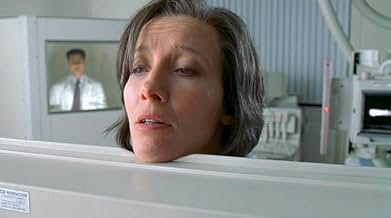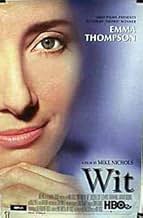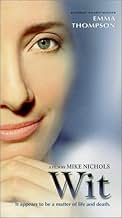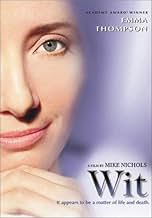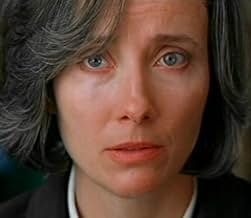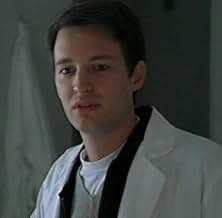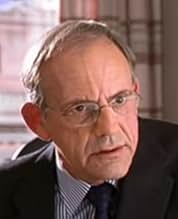Adicionar um enredo no seu idiomaA renowned professor is forced to reassess her life when she is diagnosed with terminal ovarian cancer.A renowned professor is forced to reassess her life when she is diagnosed with terminal ovarian cancer.A renowned professor is forced to reassess her life when she is diagnosed with terminal ovarian cancer.
- Direção
- Roteiristas
- Artistas
- Ganhou 3 Primetime Emmys
- 13 vitórias e 21 indicações no total
- Nurse
- (as Su-Lin Looi)
- Fellow 1
- (as Harry Dillon)
- Direção
- Roteiristas
- Elenco e equipe completos
- Produção, bilheteria e muito mais no IMDbPro
Avaliações em destaque
It also comprises a tour-de-force performance by Emma Thompson, an actor whose performances are almost always extraordinary -- so the fact that this one stands out says a lot.
The dialogue (and monologue) is amusing, minimalistic but never too little, and is always sufficient to the scene. There is plenty of irony, wry humor, and understated insight; and yet the film, stark as it is, is abundantly human and, in places, even sweet.
At the height of the grinding sorrow that Thompson so skillfully brings us into, a startling scene between her old academic mentor is a loving act of redemption, shared by them both.
As an additional note, the surprising appearance of Christopher Lloyd in this film, as the research oncologist, provides a perfect foil for Vivian's role as a patient and as an academician. Lloyd's performance is convincing, and yet it contains just enough of eccentricity and kindness to make his character's disinterested role entirely sympathetic.
A wonderful film. Not -- be warned -- an easy film to watch, but decidedly worth it.
We are given a look into life and death from the point of view of a poetry scholar who has, in turn, viewed life and death in the abstract through John Donne's poetry. She, in turn, is viewed in the abstract by a renowned doctor who views life and death as a case in a bed and by the scholar's former student who doesn't know how to communicate with patients beyond superficial catch phrases.
This is a touching, powerfully filmed play guided by the witty, amusing, profound, and painful asides and soliloquies of the main character. Her only human contact seems to be through the compassionate nurse, the scholar's old teacher, and the audience -- the point being that we too often live our lives inside walled prisons of our own construction and then come to the end realizing that we had never lived at all.
The movie could easily have descended into melodrama but instead is gritty, prim, and gripping in its own odd way. See this one if you can.
Six years ago I invited the ten medical students in my history taking group to view the film together in a setting away from the school. I have since repeated this twice yearly with each of the small groups under my charge. I made one big mistake the first year. After the movie ended I turned on the lights while the credits were running, oblivious to the sniffing and outright weeping on the part of the freshman medical students. Since then I've permitted the credits to run completely before turning on the lights. There is generally a delay of up to five minutes before any of them are able to say anything.
The student response has been uniform. Gratitude for having seen the film, awe of the realities of the profession they have chosen to enter and appreciation for the chance to come to a deeper understanding of their own selves and motivations for entering medical school.
Eileen Atkins is absolutely superb as Evelyn Ashford, PhD. Her scenes are brief but they bring the deeply religious underpinnings of the film to the fore. Her first scene, in which she recites the final stanza of Donne's Holy Sonnett X, (a scene which gave the movie its title) contrasts with the tender love in Vivian's hospital room. Her reciting of the poetry is astonishing. It was not until the sixth or so viewing (I've lost count) that I realized her parting words, "May the angels lead you to Paradise. . . " were the English translation of In Paradisum from the Roman Catholic funeral liturgy. That was one time when my tears joined the students.
Anyone working in medicine; students, residents, nurses and nursing students, aides and so on, should watch this movie. I generally used the class the day following the viewing for a discussion of the movie, the bedside manner of the docs, nurses, techs and so on as well as what feelings the movie stirred in them. The conversations have been memorable.
This is a movie that is not to be missed. It is tragic that it was made for television by HBO rather than given general theatrical release. Many fewer people have seen it is a result.
Vivian is an 'experiment' dying alone. I can still recall the relief on the face of my mother when I brought up her imminent death. She was afraid of making ME fearful. I was privileged to share my mother's dying. She shared moments of regret, painful happenings and joyful events. It was one of the best things I have done as a human being.
Vivian is clearly relieved to 'know the score' when Susie tells her that medicine will not save her. Susie gives the dying Vivian, medicine of compassion. She touches her and thereby acknowledges her as a human being.
Enter the professor who leads Vivian to the moment of death. There is no need for intellectual poetry or sparring. Instead, the professor lies on the death bed holding and supporting her friend. Tears fall from Vivian's eyes, the professor merely confirms the difficulty. The children's story is read and the professor offers her opinion - It is an allegory of a soul. We do not know if Vivian supports this statement. We only know that she dies with the knowledge that she is loved.
"Out of the mouth of babes," is a scriptural quote that confirms the wit of simplicity. I, personally, needed the bunny story. However, many children's stories have incisive clues to live's mysteries.
I am puzzled about the negative comments. Have any of these writers witnessed dying? Why do so many people negate the virtues of kindness, sympathy, touch, love, etc with weakness or by a wave of his/her hand dismiss it as 'boring.' This was not a boring movie. If you saw it this way, you missed the point. Come back, say 10-20 years from now and review it again.
Você sabia?
- CuriosidadesThis movie is often shown at medical colleges as an example of how doctors and researchers should not behave.
- Erros de gravaçãoDuring her exam with the young internist, her arms alternate repeatedly from being completely under the sheet, to being folded together on top of the sheet.
- Citações
E.M. Ashford: Do you think that the punctuation of the last line of this sonnet is merely an insignificant detail? The sonnet begins with a valiant struggle with Death calling on all the forces of intellect and drama to vanquish the enemy. But it is ultimately about overcoming the seemingly insuperable barriers separating life death and eternal life. In the edition you choose, this profoundly simple meaning is sacrificed to hysterical punctuation.
E.M. Ashford: And Death, Capital D, shall be no more, semi-colon. Death, Capital D comma, thou shalt die, exclamation mark!
E.M. Ashford: If you go in for this sort of thing I suggest you take up Shakespeare.
E.M. Ashford: Gardner's edition of the Holy Sonnets returns to the Westmoreland manuscript of 1610, not for sentimental reasons I assure you, but because Helen Gardner is a scholar.
E.M. Ashford: It reads, "And death shall be no more" comma "death, thou shalt die." Nothing but a breath, a comma separates life from life everlasting.
E.M. Ashford: Very simple, really. With the original punctuation restored Death is no longer something to act out on a stage with exclamation marks. It is a comma. A pause.
E.M. Ashford: In this way, the uncompromising way one learns something from the poem, wouldn't you say? Life, death, soul, God, past present. Not insuperable barriers. Not semi-colons. Just a comma.
- Trilhas sonorasSerenade Adagio
String Quartet #15 (2nd Movement)
Written by Dmitri Shostakovich (as Dimitri Shostakovitch)
Performed by The Manhattan String Quartet
Courtesy of Ess.a.y Recordings
Principais escolhas
Detalhes
- Data de lançamento
- País de origem
- Central de atendimento oficial
- Idioma
- Também conhecido como
- W;t
- Locações de filme
- Empresas de produção
- Consulte mais créditos da empresa na IMDbPro
- Tempo de duração
- 1 h 39 min(99 min)
- Cor
- Mixagem de som
- Proporção
- 1.85 : 1


